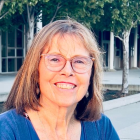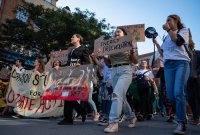Support strong Canadian climate journalism for 2025
These in-their-own-words pieces are told to Patricia Lane and co-edited with input from the interviewee for the purpose of brevity.
Chloë Fraser wants us to tell better stories about climate change. This 23-year-old Vancouver writer was named a Starfish Canada Top 25 Environmentalist Under 25 for her accredited course at the University of British Columbia (UBC) teaching participants about the power of stories to motivate climate action.
Tell us about your project
In the Spring of 2023, as part of UBC’s Student Directed Seminars program, I designed and offered students from all disciplines the course “Writing Climate Change: Storytelling and Action”. We reviewed climate literature and studied the history of environmental communication and marketing techniques.
Each of the participants explored how to use storytelling to inform their work and learned to communicate across their different disciplines. This proved both rich and challenging. Some knew the science but talked about it in ways that left others out. Social science students used words and concepts foreign to those in sciences or business. Working collaboratively, we came together to build an uplifting community.
What were some of the lessons from this project?
Growing up in a world on fire leaves many of us feeling afraid. Some campaigners worry that using marketing industry tactics will dilute key values messaging and appear manipulative. Many activists find it hard to see storytelling as action. Holding a protest sign or joining a march feels much more tangible. But if we are to broaden the conversation, we must tell stories that resonate with and respect those who do care, but in different ways. We learned if we listen, our shared stories can build resilient communities.
What made it hard?
Many young people live with intense anger, grief, and a sense of betrayal, yet our stories must reflect that individual consumers are not the appropriate target of blame. The oil, coal and gas industries and the systems they built for their profit must remain the focus.
It is also important to make sure I avoid appropriation and tell stories that are rightfully mine.

What do you worry about?
Oil, coal and gas pour billions of advertising dollars into terribly misleading stories. The climate movement is late to the public messaging game. Everything depends on us getting ahead.
What gives you hope?
I am encouraged by stories that resonate with me in movies, books and on television.
The amount of money and effort the industry pours into disinformation tells me they are on the defensive.
I keep my spirits up by spending time outside with people who care about me and lift me up. And by writing my own stories about a better future.
What do you write about?
As a teenager, I read a lot of dystopian novels. This is not a good idea. They don’t represent the future and they bring kids down. One day, I listened to CBC’s Joanna Wagstaff in 2050: Degrees of Change talking about probable futures in Vancouver based on the data. I was surprised to learn it was not nearly as bad as I had imagined and much was still possible with the right decision-making. I began imagining a future based on actual data. What will the bus system be like in 30 years? What kind of food will be on the table?
I strive to create stories that reach people with a future grounded in data and that are based in love, not just fear. In my communications work for the Pacific Salmon Foundation, I help position an iconic keystone species at the frontline of climate change. I facilitate climate workshops with CityHive and coach youth writers at The Starfish Canada. And I love writing short stories.
How did you get interested in climate work?
I spent high school at THINK Global School living in four different countries each school year. In Peru, I heard the rage and fear of locals as they defended their right to water in the face of shortages. In Mumbai, I coughed on smog and watched from my bedroom window as monsoon waters and sewage swept through the streets. I became more aware of my privilege and determined to be part of the solution.
What do you see if we get this right?
Being engaged in climate action will be normal and part of our every day. Right now, the movement excludes too many who are new or too overwhelmed with caretaking and making a living to participate in the kinds of activities we narrowly define as activism.
What advice would you give other young people?
You have a right to be happy. Don’t let yourself drown in how difficult it can all seem. See yourself as more than your activism. I am learning that I have worth as a daughter, a sister, and a friend.
What about older readers?
Find the compassion to understand that we are young and feel betrayed, so we may lash out. Stand with us. We need each other.
Chloë Fraser is a writer, facilitator, and communications adviser in Vancouver, British Columbia. She holds a BA from UBC in International Relations and Creative Writing and a BA in Economics, Law, and Ethics from Sciences Po Paris. Portfolio: www.chloealiciafraser.com







Comments